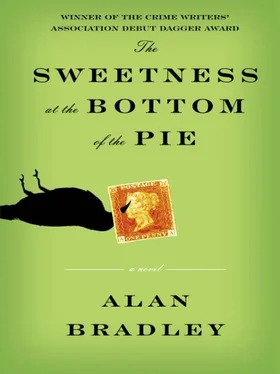Alan Bradley - The Sweetness at the Bottom of the Pie
Здесь есть возможность читать онлайн «Alan Bradley - The Sweetness at the Bottom of the Pie» весь текст электронной книги совершенно бесплатно (целиком полную версию без сокращений). В некоторых случаях можно слушать аудио, скачать через торрент в формате fb2 и присутствует краткое содержание. Жанр: Старинная литература, на английском языке. Описание произведения, (предисловие) а так же отзывы посетителей доступны на портале библиотеки ЛибКат.
- Название:The Sweetness at the Bottom of the Pie
- Автор:
- Жанр:
- Год:неизвестен
- ISBN:нет данных
- Рейтинг книги:3 / 5. Голосов: 1
-
Избранное:Добавить в избранное
- Отзывы:
-
Ваша оценка:
- 60
- 1
- 2
- 3
- 4
- 5
The Sweetness at the Bottom of the Pie: краткое содержание, описание и аннотация
Предлагаем к чтению аннотацию, описание, краткое содержание или предисловие (зависит от того, что написал сам автор книги «The Sweetness at the Bottom of the Pie»). Если вы не нашли необходимую информацию о книге — напишите в комментариях, мы постараемся отыскать её.
The Sweetness at the Bottom of the Pie — читать онлайн бесплатно полную книгу (весь текст) целиком
Ниже представлен текст книги, разбитый по страницам. Система сохранения места последней прочитанной страницы, позволяет с удобством читать онлайн бесплатно книгу «The Sweetness at the Bottom of the Pie», без необходимости каждый раз заново искать на чём Вы остановились. Поставьте закладку, и сможете в любой момент перейти на страницу, на которой закончили чтение.
Интервал:
Закладка:
Luckily, I found a pitcher of cool milk in the pantry. I poured out a tall glass of it, and dashed into the garden.
"Here, drink this," I said, holding it out to him.
Dogger took the drink in both hands, stared at it for a long moment as if he didn't know what to do with it, and then raised it unsteadily to his mouth. He drank deeply until the milk was gone. He handed me the empty glass.
For a moment, he looked vaguely beatific, like an angel by Raphael, but that impression quickly passed.
"You have a white mustache," I told him. I bent down to the cucumbers and, tearing off a large, dark green leaf from the vine, used it to wipe his upper lip.
The light was coming back into his empty eyes.
"Milk and cucumbers." he said. "Cucumbers and milk."
"Poison!" I shouted, jumping up and down and flapping my arms like a chicken, to show him that everything was under control. "Deadly poison!" And we both laughed a little.
He blinked.
"My!" he said, looking round the garden as if he were a princess coming awake from the deepest dream, "isn't it turning out to be a lovely day!"
FATHER DID NOT APPEAR AT LUNCH. To reassure myself, I put an ear to his study door and listened for a few minutes to the flipping of philatelic pages and an occasional clearing of the paternal throat. Nerves, I decided.
At the table, Daphne sat with her nose in Walpole (Horace), her cucumber sandwich beside her, soggy and forgotten on a plate. Ophelia, sighing endlessly, crossing, uncrossing, and recrossing her legs, stared blankly off into space, and I could only assume she was trifling in her mind with Ned Cropper, the jack-of-all-trades at the Thirteen Drakes. She was too absorbed in her haughty reverie to notice when I leaned in for a closer look at her lips as she reached absently for a cube of cane sugar, popped it into her mouth, and began sucking.
"Ah," I remarked, to no one in particular, "the pimples will be blooming in the morning."
She made a lunge for me, but my legs were faster than her flippers.
Back upstairs in my laboratory, I wrote:

Friday, 2nd of June 1950, 1:07 P.M. No visible reaction as yet. "Patience is a necessary ingredient of genius."
-(Disraeli)TEN O'CLOCK HAD COME and gone, and still I couldn't sleep. Mostly, when the light's out I'm a lump of lead, but tonight was different. I lay on my back, hands clasped behind my head, reviewing the day.
First there had been Father. Well, no, that's not quite true. First there had been the dead bird on the doorstep—and then there had been Father. What I thought I had seen on his face was fear, but still there was some little corner of my brain that didn't seem to believe it.
To me—to all of us—Father was fearless. He had seen things during the War: horrid things that must never be put into words. He had somehow survived the years of Harriet's vanishing and presumed death. And through it all he had been stalwart, staunch, dogged, and unshakeable. Unbelievably British. Unbearably stiff upper lip. But now…
And then there was Dogger: Arthur Wellesley Dogger, to give him his “full patronymic” (as he called it on his better days). Dogger had come to us first as Father's valet, but then, as “the full vicissitudes of that position” (his words, not mine) bore down upon his shoulders, he found it “more copacetic” to become butler, then chauffeur, then Buckshaw's general handyman, then chauffeur again for a while. In recent months, he had rocked gently down, like a falling autumn leaf, before coming to rest in his present post of gardener, and Father had donated our Hillman estate wagon to St. Tancred's as a raffle prize.
Poor Dogger! That's what I thought, even though Daphne told me I should never say that about anyone: “It's not only condescending, it fails to take into account the future,” she said.
Still, who could forget the sight of Dogger in the garden? A great simple hulk of a helpless man just standing there, hair and tools in disarray, wheelbarrow overturned, and a look on his face as if… as if…
A rustle of sound caught my ear. I turned my head and listened.
Nothing.
It is a simple fact of Nature that I happen to possess acute hearing: the kind of hearing, Father once told me, that allows its owner to hear spiderwebs clanging like horseshoes against the walls. Harriet had possessed it too, and sometimes I like to imagine I am, in a way, a rather odd remnant of her: a pair of disembodied ears drifting round the haunted halls of Buckshaw, hearing things that are sometimes better left unheard.
But, listen! There it was again! A voice reflected; hard and hollow, like a whisper in an empty biscuit tin.
I slipped out of bed and went on tiptoes to the window. Taking care not to jiggle the curtains, I peeked out into the kitchen garden just as the moon obligingly came out from behind a cloud to illuminate the scene, much as it would in a first-rate production of A Midsummer Night's Dream .
But there was nothing more to see than its silvery light dancing among the cucumbers and the roses.
And then I heard a voice: an angry voice, like the buzzing of a bee in late summer trying to fly through a closed windowpane.
I threw on one of Harriet's Japanese silk housecoats (one of the two I had rescued from the Great Purge), shoved my feet into the beaded Indian moccasins that served as slippers, and crept to the head of the stairs. The voice was coming from somewhere inside the house.
Buckshaw possessed two Grand Staircases, each one winding down in a sinuous mirror image of the other, from the first floor, coming to earth just short of the black painted line that divided the checker-tiled foyer. My staircase, from the “Tar,” or east wing, terminated in that great echoing painted hall beyond which, over against the west wing, was the firearm museum, and behind it, Father's study. It was from this direction that the voice was emanating. I crept towards it.
I put an ear to the door.
"Besides, Jacko," a caddish voice was saying on the other side of the paneled wood, "how could you live in the light of discovery? How could you ever go on?"
For a queasy instant I thought George Sanders had come to Buckshaw, and was lecturing Father behind closed doors.
"Get out," Father said, his voice not angry, but in that level, controlled tone that told me he was furious. In my mind I could see his furrowed brow, his clenched fists, and his jaw muscles taut as bowstrings.
"Oh, come off it, old boy," said the oily voice. "We're in this together—always have been, always will be. You know it as well as I."
"Twining was right," Father said. "You're a loathsome, despicable excuse for a human being."
"Twining? Old Cuppa? Cuppa's been dead these thirty years, Jacko—like Jacob Marley. But, like said Marley, his ghost lingers on. As perhaps you've noticed."
"And we killed him," Father said, in a flat, dead voice.
Had I heard what I'd heard? How could he—
By taking my ear from the door and bending to peer through the keyhole I missed Father's next words. He was standing beside his desk, facing the door. The stranger's back was to me. He was excessively tall, six foot four, I guessed. With his red hair and rusty gray suit, he reminded me of the Sandhill Crane that stood stuffed in a dim corner of the firearm museum.
I reapplied my ear to the paneled door.
". no statute of limitations on shame," the voice was saying. "What's a couple of thousand to you, Jacko? You must have come into a fair bit when Harriet died. Why, the insurance alone—"
"Shut your filthy mouth!" Father shouted. "Get out before I—"
Suddenly I was seized from behind and a rough hand was clapped across my mouth. My heart almost leaped out of my chest.
Читать дальшеИнтервал:
Закладка:
Похожие книги на «The Sweetness at the Bottom of the Pie»
Представляем Вашему вниманию похожие книги на «The Sweetness at the Bottom of the Pie» списком для выбора. Мы отобрали схожую по названию и смыслу литературу в надежде предоставить читателям больше вариантов отыскать новые, интересные, ещё непрочитанные произведения.
Обсуждение, отзывы о книге «The Sweetness at the Bottom of the Pie» и просто собственные мнения читателей. Оставьте ваши комментарии, напишите, что Вы думаете о произведении, его смысле или главных героях. Укажите что конкретно понравилось, а что нет, и почему Вы так считаете.












